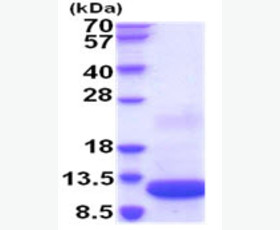Recombinant Mouse Resistin/ADSF/RETN
| Product name: | Recombinant Mouse Resistin/ADSF/RETN |
| Source: | Human Cells |
| Purity: | Greater than 95% as determined by reducing SDS-PAGE. |
| Buffer Formulation: | Lyophilized from a 0.2 μm filtered solution of 20mM PB,150mM NaCl,pH7.4. |
| Applications: | Applications:SDS-PAGE; WB; ELISA; IP. |
| Storage: | Avoid repeated freeze/thaw cycles. Store at 2-8 oC for one month. Aliquot and store at -80 oC for 12 months. |
| UOM: | 100ug/50ug/200ug/1mg/1g |
| Source | Human Cells |
| Description | Recombinant Mouse Adipose tissue-specific secretory factor is produced by our Mammalian expression system and the target gene encoding Ser21-Ser114 is expressed with a 6His tag at the C-terminus. |
| Names | Resistin,Retn,Adipose tissue-specific secretory factor,ADSF,Adipose-specific cysteine-rich secreted protein A12-alpha,Cysteine-rich secreted protein FIZZ3,Fizz3 |
| Accession # | Q99P87 |
| Formulation | Lyophilized from a 0.2 μm filtered solution of 20mM PB,150mM NaCl,pH7.4. |
| Shipping |
The product is shipped at ambient temperature. |
| Reconstitution |
Always centrifuge tubes before opening. Do not mix by vortex or pipetting. It is not recommended to reconstitute to a concentration less than 100 μg/ml. Dissolve the lyophilized protein in ddH2O. Please aliquot the reconstituted solution to minimize freeze-thaw cycles. |
| Storage |
Lyophilized protein should be stored at < -20°C, though stable at room temperature for 3 weeks. Reconstituted protein solution can be stored at 4-7°C for 2-7 days. Aliquots of reconstituted samples are stable at < -20°C for 3 months. |
| Purity |
Greater than 95% as determined by reducing SDS-PAGE. |
| Endotoxin | Less than 0.1 ng/µg (1 IEU/µg) as determined by LAL test. |
| Amino Acid Sequence |
SSMPLCPIDEAIDKKIKQDFNSLFPNAIKNIGLNCWTVSSRGKLASCPEGTAVLSCSCGSACGSW DIREEKVCHCQCARIDWTAARCCKLQVASVDHHHHHH
|
| Background | Resistin is a cysteine-rich adipose-derived peptide hormone, which belongs to the resistin/FIZZ family. Resistin has been shown to cause high levels of 'bad' cholesterol (low-density lipoprotein or LDL), increasing the risk of heart disease, resistin increases the production of LDL in human liver cells and also degrades LDL receptors in the liver. As a result, the liver is less able to clear 'bad' cholesterol from the body. Resistin accelerates the accumulation of LDL in arteries, increasing the risk of heart disease, resistin adversely impacts the effects of statins, the main cholesterol-reducing drug used in the treatment and prevention of cardiovascular disease. |














